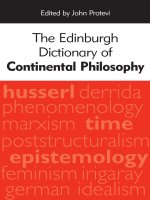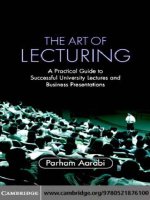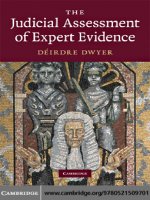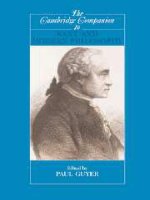0521817439 cambridge university press the cambridge companion to arabic philosophy jan 2005
Bạn đang xem bản rút gọn của tài liệu. Xem và tải ngay bản đầy đủ của tài liệu tại đây (2.59 MB, 458 trang )
the cambridge companion to
ARABIC PHILOSOPHY
Philosophy written in Arabic and in the Islamic world represents one of the great traditions of Western philosophy.
Inspired by Greek philosophical works and the indigenous
ideas of Islamic theology, Arabic philosophers from the ninth
century onwards put forward ideas of great philosophical and
historical importance. This collection of essays, by some of
the leading scholars in Arabic philosophy, provides an introduction to the field by way of chapters devoted to individual thinkers (such as al-Fa¯ra¯bı¯, Avicenna, and Averroes) or
groups, especially during the ‘classical’ period from the ninth
to the twelfth centuries. It also includes chapters on areas of
philosophical inquiry across the tradition, such as ethics and
metaphysics. Finally, it includes chapters on later Islamic
thought, and on the connections between Arabic philosophy
and Greek, Jewish, and Latin philosophy. The volume also
includes a useful bibliography and a chronology of the most
important Arabic thinkers.
other volumes in the series of cambridge companions
A B E L A R D Edited by jeffrey e. brower and kevin
guilfoy
A D O R N O Edited by thomas huhn
A Q U I N A S Edited by norman kretzmann and
eleonore stump
H A N N A H A R E N D T Edited by dana villa
A R I S T O T L E Edited by jonathan barnes
A U G U S T I N E Edited by eleonore stump and
norman kretzmann
B A C O N Edited by markku peltonen
S I M O N E D E B E A U V O I R Edited by claudia card
B R E N TA N O Edited by dale jacquette
C R I T I C A L T H E O RY Edited by fred rush
D A RW I N Edited by jonathan hodge and
gregory radick
D E S C A RT E S Edited by john cottingham
D U N S S C O T U S Edited by thomas williams
E A R LY G R E E K P H I L O S O P H Y Edited by a. a. long
F E M I N I S M I N P H I L O S O P H Y Edited by miranda
fricker and jennifer hornsby
F O U C A U LT Edited by gary gutting
F R E U D Edited by jerome neu
G A D A M E R Edited by robert j. dostal
G A L I L E O Edited by peter machamer
G E R M A N I D E A L I S M Edited by karl ameriks
G R E E K A N D R O M A N P H I L O S O P H Y Edited by
david sedley
H A B E R M A S Edited by stephen k. white
H E G E L Edited by frederick beiser
H E I D E G G E R Edited by charles guignon
H O B B E S Edited by tom sorell
H U M E Edited by david fate norton
H U S S E R L Edited by barry smith and david
woodruff smith
W I L L I A M J A M E S Edited by ruth anna putnam
K A N T Edited by paul guyer
K I E R K E G A A R D Edited by alastair hannay and
gordon marino
L E I B N I Z Edited by nicholas jolley
L E V I N A S Edited by simon critchley and robert
bernasconi
L O C K E Edited by vere chappell
M A L E B R A N C H E Edited by steven nadler
M A R X Edited by terrell carver
M E D I E VA L P H I L O S O P H Y Edited by a. s. mcgrade
M E D I E VA L J E W I S H P H I L O S O P H Y Edited by
daniel h. frank and oliver leaman
M E R L E A U - P O N T Y Edited by taylor carman and
mark hansen
M I L L Edited by john skorupski
N E W T O N Edited by i. bernard cohen and
george e. smith
N I E T Z S C H E Edited by bernd magnus and
kathleen higgins
O C K H A M Edited by paul vincent spade
PA S C A L Edited by nicholas hammond
P E I R C E Edited by cheryl misak
P L AT O Edited by richard kraut
P L O T I N U S Edited by lloyd p. gerson
R AW L S Edited by samuel freeman
Q U I N E Edited by roger f. gibson
T H O M A S R E I D Edited by terence cuneo and rene
van woudenberg
R O U S S E A U Edited by patrick riley
B E RT R A N D R U S S E L L Edited by nicholas griffin
S A RT R E Edited by christina howells
S C H O P E N H A U E R Edited by christopher janaway
T H E S C O T T I S H E N L I G H T E N M E N T Edited by
alexander broadie
S P I N O Z A Edited by don garrett
T H E S T O I C S Edited by brad inwood
W I T T G E N S T E I N Edited by hans sluga and
david stern
The Cambridge Companion to
ARABIC
PHILOSOPHY
Edited by
Peter Adamson
King’s College London
Richard C. Taylor
Marquette University
published by the press syndicate of the university of cambridge
The Pitt Building, Trumpington Street, Cambridge, United Kingdom
cambridge university press
The Edinburgh Building, Cambridge, cb2 2ru, UK
40 West 20th Street, New York, ny 10011–4211, USA
477 Williamstown Road, Port Melbourne, vic 3207, Australia
Ruiz de Alarco´n 13, 28014 Madrid, Spain
Dock House, The Waterfront, Cape Town 8001, South Africa
C
Cambridge University Press 2005
This book is in copyright. Subject to statutory exception
and to the provisions of relevant collective licensing agreements,
no reproduction of any part may take place without
the written permission of Cambridge University Press.
First published 2005
Printed in the United Kingdom at the University Press, Cambridge
Typeface Trump Medieval 10/13 pt.
System LATEX 2ε [tb]
A catalogue record for this book is available from the British Library
Library of Congress Cataloguing in Publication data
The Cambridge companion to Arabic philosophy / edited by Peter Adamson and
Richard C. Taylor.
p. cm. – (Cambridge companions to philosophy)
Includes bibliographical references (p. ) and index.
isbn 0 521 81743 9 – isbn 0 521 52069 X (pb.)
1. Philosophy, Arab. i. Adamson, Peter, 1972– ii. Taylor, Richard C., 1950–
iii. Series.
b741.c36 2004
181 .92 – dc22 2004049660
isbn 0 521 81743 9 hardback
isbn 0 521 52069 X paperback
The publisher has used his best endeavours to ensure that the URLs for external
websites referred to in this book are correct and active at the time of going to press.
However, the publisher has no responsibility for the websites and can make no
guarantee that a site will remain live or that the content is or will remain
appropriate.
contents
Notes on contributors
Note on the text
Chronology of major philosophers
in the Arabic tradition
page ix
xiii
xv
1
Introduction
peter adamson and richard c. taylor
2
Greek into Arabic: Neoplatonism in translation
cristina d’ancona
10
3
Al-Kindı¯ and the reception of Greek philosophy
peter adamson
32
4
Al-Fa¯ra¯bı¯ and the philosophical curriculum
david c. reisman
52
5
The Isma¯‘ı¯lı¯s
paul e. walker
72
6
Avicenna and the Avicennian Tradition
robert wisnovsky
92
7
Al-Ghaza¯lı¯
michael e. marmura
137
8
Philosophy in Andalusia: Ibn Ba¯jja and Ibn T.ufayl
josef puig montada
155
vii
1
viii
9
Contents
Averroes: religious dialectic and Aristotelian
philosophical thought
richard c. taylor
10
Suhrawardı¯ and Illuminationism
john walbridge
11
Mysticism and philosophy: Ibn ‘Arabı¯ and
Mulla¯ S.adra¯
sajjad h. rizvi
180
201
224
12
Logic
tony street
247
13
Ethical and political philosophy
charles e. butterworth
266
14
Natural philosophy
marwan rashed
287
15
Psychology: soul and intellect
deborah l. black
308
16
Metaphysics
the´re`se-anne druart
327
17
Islamic philosophy and Jewish philosophy
steven harvey
349
18
Arabic into Latin: the reception of Arabic
philosophy into Western Europe
charles burnett
19
370
Recent trends in Arabic and Persian philosophy
hossein ziai
405
Select bibliography and further reading
Index
426
442
notes on contributors
p e t e r a da m s o n is a Lecturer in Philosophy at King’s College
London. He has published several articles on the circle of al-Kindı¯
and is the author of The Arabic Plotinus: A Philosophical Study of
the “Theology of Aristotle” (2002).
d e b o r a h l . b l ac k is Professor of Philosophy and Medieval Studies at the University of Toronto. She is the author of Logic and
Aristotle’s “Rhetoric” and “Poetics” in Medieval Arabic Philosophy
(1990), and of several articles on medieval Arabic and Latin philosophy, focusing on issues in epistemology, cognitive psychology, and
metaphysics.
c h a r l e s b u r n e t t is Professor in the History of Arabic/Islamic
Influence in Europe at the Warburg Institute, University of London.
He has written extensively on the transmission of Arabic learning
to the West and has edited several Latin translations of Arabic texts.
c h a r l e s e . b u t t e r wo r t h is Professor of Government and Politics at the University of Maryland, College Park. His publications
include critical editions of most of the Middle Commentaries written
by Averroes on Aristotle’s logic; translations of books and treatises
by Averroes, al-Fa¯ra¯bı¯, and al-Ra¯zı¯, as well as Maimonides; and studies of different aspects of the political teaching of these and other
thinkers in the ancient, medieval, and modern tradition of philosophy. In addition, he has written monograph analyses of the political
thought of Frantz Fanon and Jean-Jacques Rousseau and has also written extensively on contemporary Islamic political thought. He is a
member of several learned organizations.
ix
x
Notes on contributors
c r i s t i n a d ’ a n c o n a is research assistant in the Department of
Philosophy of the Universita` degli Studi di Pisa. Her research focuses
on Greek and Arabic Neoplatonism. The author of Recherches sur
le “Liber de Causis” (1995) and numerous articles about the transmission of Greek thought into Arabic, she is currently writing a
commentary on and translation of the Graeco-Arabic Plotinus.
t h e´ r e` s e - a n n e d rua r t is Professor of Philosophy and Director
of the Center for Medieval and Byzantine Studies at The Catholic
University of America. Her recent publications include “Philosophy
in Islam” for The Cambridge Companion to Medieval Philosophy.
She publishes regular bibliographies in Islamic philosophy and theology and is preparing a book on al-Fa¯ra¯bı¯’s metaphysics.
s t e v e n h a rv ey, Professor of Philosophy at Bar-Ilan University,
Israel, is the author of Falaquera’s Epistle of the Debate: An Introduction to Jewish Philosophy (1987) and the editor of The Medieval
Hebrew Encyclopedias of Science and Philosophy (2000). He has
written numerous articles on the medieval Jewish and Islamic
philosophers, with special focus on Averroes’ commentaries on
Aristotle and on the influence of the Islamic philosophers on Jewish
thought.
m i c h a e l e . m a r m u r a is Professor Emeritus at the University of
Toronto and a Fellow of the Royal Society of Canada. His area of
research is Islamic thought, and his publications in this area have
included numerous articles on Avicenna and al-Ghaza¯lı¯. They also
include editions and translations, including a facing-page translation
of al-Ghaza¯lı¯’s Incoherence of the Philosophers (1997) and Avicenna’s
Metaphysics from al-Shifa¯’ (forthcoming).
j o s e f p u i g m o n t a da is Professor of Arabic and Islamic Studies
at Universidad Complutense of Madrid. He has edited and translated texts of Avempace and Averroes, on whom he has published an
introductory monograph, Averroes: juez, me´dico y filo´sofo andalusı´
(1998). He has also published articles on a number of Arab thinkers
and on various subjects of Islamic philosophy and theology.
m a r wa n r a s h e d is research fellow at the CNRS in Paris. His
area of research includes ancient and medieval philosophy. He has
¨
published Die Uberlieferungsgeschichte
der aristotelischen Schrift
Notes on contributors
xi
“De Generatione et Corruptione” (2001), and his edition of the
De Generatione et Corruptione will appear in the Bude´ series in
2004. He is currently working on the edition of the fragments of
Alexander of Aphrodisias’ commentary on Aristotle’s Physics.
dav i d c . r e i s m a n is Assistant Professor of Arabic-Islamic
Thought at the University of Illinois, Chicago. He is author of The
Making of the Avicennan Tradition (2002) and editor of Before and
After Avicenna (2003).
s a j j a d h . r i z v i is Research Associate in Islamic Philosophy at
the University of Bristol. A specialist on later Islamic philosophy and
hermeneutics, he is the author of the forthcoming Understanding
the Word of God and Mulla Sadra: A Philosopher for Mystics?
t o n y s t r e e t is the Hartwell Assistant Director of Research in
Islamic Studies at the Faculty of Divinity at the University of
Cambridge. He has published a number of articles on Arabic logic.
r i c h a r d c . t ay l o r , of the Philosophy Department at
Marquette University, works in Arabic philosophy, its Greek
sources, and its Latin influences. He has written on the Liber
de Causis, Averroes, and other related topics. He has a complete
English translation of Averroes’ Long Commentary on the “De
Anima” of Aristotle forthcoming.
j o h n wa l b r i d g e is Professor of Near Eastern Languages and
Adjunct Professor of Philosophy and of History and Philosophy of
Science at Indiana University, Bloomington. He is the author or coauthor of four books on Suhrawardı¯ and his school. He is currently
working on two books on the role of rationalism in Islamic civilization.
pau l e . wa l k e r is a research associate in Near Eastern Languages
at the University of Chicago. He is the author of Early Philosophical
Shiism (1993), Ha¯mı¯d al-Dı¯n al-Kirma¯nı¯ (1999), and Exploring an
Islamic Empire: Fatimid History and Its Sources (2002), along with
several editions and translations of important Islamic texts including
A Guide to Conclusive Proofs for the Principles of Belief: Kita¯b alirsha¯d ila¯ qawa¯t.i‘ al-adilla fı¯ us.u¯l al-i‘tiqa¯d by al-Juwaynı¯ (2000) and
numerous articles on aspects of Isma¯‘ı¯lı¯ history and thought.
xii
Notes on contributors
ro b e r t w i s n ov s k y is Associate Professor in the Institute of
Islamic Studies at McGill University. He is the editor of Aspects of
Avicenna (2001) and the author of Avicenna’s Metaphysics in Context (2003) as well as of a number of articles on Arabic and Islamic
philosophy and theology.
h o s s e i n z i a i is Professor of Islamic and Iranian Studies at UCLA.
He has published many articles and several books on the Arabic
and Persian Illuminationist system of philosophy. He has published
several text-editions and translations of Arabic and Persian Illuminationist texts including Suhrawardı¯’s Philosophy of Illumination,
Shahrazu¯rı¯’s Commentary on the Philosophy of Illumination, and
Ibn Kammu¯na’s Commentary on Suhraward¯ı’s Intimations.
note on the text
Please note that all names in this volume are given in full transliteration (e.g., al-Fa¯ra¯bı¯, not Alfarabi or al-Farabi), except for Ibn Sı¯na¯ and
Ibn Rushd, where we defer to tradition and use the familiar Latinized
names Avicenna and Averroes. The same goes for all Arabic terms;
thus we write Isma‘¯
¯ ıl¯ı rather than Ismaili, Qur’an
¯ rather than Koran,
etc. We have generally followed the transliteration system used in
the International Journal of Middle Eastern Studies, but used the
simplest transliteration conventions possible: the feminine ending
ta¯’ marbu¯t.a is always written –a, and the definite article is always
written al-.
There is a numbered bibliography at the end of this book. Chapter
authors refer both to items in this bibliography and to unnumbered
works specific to their chapters.
xiii
chronology of major philosophers
in the arabic tradition
The following is a list of the dates of the major philosophers and
other authors in the Arabic tradition who are mentioned in this volume, in approximate chronological order according to the date of
their death. The main sources used in compiling this set of dates
are The Encyclopaedia of Islam [16], Nasr and Leaman [34], and C.
Brockelmann, Geschichte der arabischen Literatur, 5 vols. (Leiden:
1937–49). (Note that the dating of the Epistles of Ikhwa¯n al-S.afa¯’ is
disputed. For a discussion see Encyclopaedia of Islam [16], vol. II,
1072–3). Dates are given in A.H. (the Muslim calendar) followed by
C.E. Jewish authors’ dates are given in C.E. only. Dates elsewhere in
this volume are generally given in C.E. only. For conversion tables
between the two calendars, see G. S. P. Freeman-Grenville, The Muslim and Christian Calendars, 2nd edn. (London: 1977). Figures from
the twentieth century are not included here; for these thinkers see
chapter 19. The editors thank David Reisman for corrections and
suggestions.
Sergius of Resh‘ayna¯ (d. 536 C.E.)
Ibn al-Muqaffa‘ (d. 139/757)
Al-Muqammas., Da¯wu¯d (early 9th c.)
Ma¯sha¯’alla¯h (d. ca. 200/815)
Ibn al-Bit.rı¯q (fl. ca. 200/815)
Abu¯ al-Hudhayl (d. ca. 226/840)
Al-Naz.z.a¯m (d. between 220/835 and 230/845)
Al-H
. ims.ı¯, Ibn Na¯‘ima (fl. ca. 215/830)
Al-Kindı¯ (d. after 256/870)
Ibn Ish.a¯q, H
. unayn (d. ca. 260/873)
Al-Balkhı¯, Abu¯ Ma‘shar (d. 272/886)
xv
xvi
Chronology of major philosophers
Ibn Qurra, Tha¯bit (d. 288/901)
Ibn H
. ayla¯n, Yuh.anna¯ (d. 297/910)
Ibn H
¯ (d. 298/910–11)
. unayn, Ish.aq
Ibn Luq
¯ a,
¯ Qust.a¯ (ca. 205/820–300/912)
Al-Jubba¯’ı¯, Abu¯ ‘Alı¯ (d. 303/915–16)
Al-Dimashqı¯, Abu¯ ‘Uthma¯n (d. early 4th/10th c.)
Al-Ra¯zı¯, Abu¯ Bakr (d. 313/925)
Abu¯ Tamma¯m (4th/10th c.)
Al-Balkhı¯, Abu¯ al-Qa¯sim (d. 319/931)
Al-Jubba¯‘ı¯, Abu¯ Ha¯shim (d. 321/933)
Al-Ra¯zı¯, Abu¯ H
. a¯tim (d. 322/934)
Al-Balkhı¯, Abu¯ Zayd (d. 322/934)
Al-Ash‘arı¯, Abu¯ al-H
. asan (d. 324/935–6)
Ibn Yu¯nus, Abu¯ Bishr Matta¯ (d. 328/940)
Gaon, Saadia (882–942)
Al-Nasafı¯, Muh.ammad (d. 332/943)
Al-Fa¯ra¯bı¯ (d. 339/950–1)
Israeli, Isaac (d. 955)
Ikhwa¯n al-S.afa¯’ (The Brethren of Purity) (4th/10th c.)
Al-Sijista¯nı¯, Abu¯ Ya‘qu¯b (d. ca. 361/971)
Ibn ‘Adı¯, Yah.ya¯ (d. 363/974)
Al-Sı¯ra¯fı¯, Abu¯ Sa‘ı¯d (d. 369/979)
Al-Sijistan¯
¯ ı (al-Mant.iq¯ı), Abu¯ Sulayman
¯ (d. ca. 375/985)
Al-Andalus¯
¯ ı, Ibn Juljul (d. after 377/987)
¯
Al-‘Amirı
¯ (d. 381/991)
Ibn al-Nadı¯m (d. either 385/995 or 388/998)
¯ ¯ (d. 398/1008)
Ibn Zur‘a¯, Abu¯ ‘Alı¯ ‘Isa
Al-Kirma¯nı¯, H
amı
d
al-Dı
¯
¯n (d. ca. 412/1021)
.
‘Abd al-Jabba¯r (d. 415/1024–5)
Ibn Miskawayh (d. 421/1030)
Avicenna (Ibn Sı¯na¯) (370/980–428/1037)
Ibn al-Haytham (Alhazen) (d. ca. 432/1040)
Ibn al-T.ayyib, Abu¯ al-Faraj (d. 434/1043)
Al-Bı¯ru¯nı¯ (d. 440/1048)
Ibn Gabirol, Solomon (Avicebron) (1021–58 or 1070)
Ibn H
. azm (d. 456/1064)
Ibn Marzuba¯n, Bahmanya¯r (d. 459/1066)
Ibn S.a¯‘id al-Andalu¯sı¯, Abu¯ al-Qa¯sim S.a¯‘id (d. 462/1070)
Ibn Mattawayh (d. 469/1076–7)
Chronology of major philosophers
Na¯s.ir-i Khusraw (d. ca. 470/1077)
Al-Shı¯ra¯zı¯, al-Mu’ayyad fı¯ al-Dı¯n (d. 470/1077)
Al-Juwayn¯ı, Imam
¯ al-H
. aramayn (d. 478/1085)
Al-Lawkar¯ı, Abu¯ al-Abbas
¯ (fl. 503/1109–10)
Al-Ghaza¯lı¯, Abu¯ H
. a¯mid (450/1058–505/1111)
Al-Nasafı¯, Abu¯ al-Mu‘ı¯n (d. 508/1114–15)
Ibn Ba¯jja (Avempace) (d. 533/1139)
Halevi, Judah (d. 1141)
Al-Baghda¯dı¯, Abu¯ al-Baraka¯t (d. after 560/1164–5)
Ibn Da’ud, Abraham (ca. 1110–80)
Ibn T.ufayl (d. 581/1185–6)
Suhrawardı¯ (549/1154–587/1191)
Averroes (ibn Rushd) (520/1126–595/1198)
Al-Bit.ru¯jı¯ (fl. ca. 600/1204)
Maimonides (1135 or 1138–1204)
Al-Ra¯zı¯, Fakhr al-Dı¯n (d. 606/1210)
Al-Baghda¯dı¯, ‘Abd al-Lat.ı¯f (d. 628/1231)
Ibn ‘Arabı¯ (560/1165–638/1240)
Ibn Yu¯nus, Kama¯l al-Dı¯n (d. 639/1242)
Ibn al-Qift.ı¯ (d. 646/1248)
Falaquera, Shem-Tov (d. ca. 1295)
Al-Abharı¯, Athı¯r al-Dı¯n (d. 663/1264)
Ibn Ab¯ı Us.aybi‘a (d. 668/1270)
Al-T.us¯
¯ ı, Nas.ı¯r al-D¯ın (d. 672/1274)
Al-Ka¯tibı¯, Najm al-Dı¯n al-Qazwı¯nı¯ (d. 675/1276)
Ibn Kammu¯na, Sa‘d al-Dı¯n (d. 1277)
Al-Bayd.a¯wı¯ (d. 685/1286 or 691/1292)
Al-Shahrazu¯rı¯, Shams al-Dı¯n (d. after 688/1289)
Albalag, Isaac (late 13th c.)
Al-Shı¯ra¯zı¯, Qut.b al-Dı¯n (d. 710/1311)
Al-H
. illı¯, al-‘Alla¯ma (d. 726/1325)
Ibn Taymiyya (d. 728–9/1328)
Gersonides (Levi ben Gerson) (1288–1344)
Al-Is.faha¯nı¯, Mah.mu¯d (d. 749/1348)
¯ ¯ (d. 756/1355)
Al-Ijı
Ibn al-Khat.ı¯b (d. 776/1375)
Al-Tafta¯za¯nı¯, Sa‘d al-Dı¯n (d. 792/1390)
Ibn Khaldu¯n (732/1332–808/1406)
Crescas, H
. asdai (d. ca. 1411)
xvii
xviii
Chronology of major philosophers
Is.faha¯nı¯, Ibn Torkeh (S.a¯’in al-Dı¯n) (d. ca. 836–7/1432)
Dashtakı¯, S.adr al-Dı¯n (d. 903/1497)
Dawwan¯
¯ ı, Jalal
¯ al-D¯ın (d. 907/1501)
Al-Dimashq¯ı, Muh.ammad b. Makk¯ı Shams al-D¯ın
(d. 937/1531)
Dashtakı¯, Ghiya¯th al-Dı¯n Mans.u¯r (d. 949/1542)
Mı¯r Da¯ma¯d (d. 1041/1631)
Mulla S.adra¯ (S.adr al-Dı¯n al-Shı¯ra¯zı¯) (979/1571–1050/1640)
Al-La¯hı¯jı¯ (d. 1072/1661)
Sabziwa¯rı¯ (d. 1289/1872)
peter adamson and richard c. taylor
1
Introduction
The history of philosophy in Arabic goes back almost as far as Islam
itself. Philosophically interesting theological disputes were underway within two centuries of the founding of Islam in 622 C.E. At
the same time some important scientific, medical, and philosophical texts from the Greek tradition were being studied and used in the
Syriac tradition, with Aristotelian logic being employed in theological debates. By the third century of the Muslim calendar (the ninth
century C.E.), a great translation movement centered in Baghdad was
in full bloom. In response, Muslim, Christian, and Jewish philosophers writing in Arabic began to make important contributions to a
tradition of philosophizing that continues alive to the present day.
Debates and contests on logic, grammar, theology, and philosophy
by Muslims, Christians, and Jews took place at the caliphal court.
The structure and foundation of the cosmos, the natures of entities
in the physical world, the relation of human beings to the transcendent divine, the principles of metaphysics, the nature of logic and
the foundations of epistemology, and the pursuit of the good life in
ethics – in sum, the traditional issues of philosophy, old wine, albeit
in new skins – were debated with intensity, originality, and penetrating insight.
This was the beginning of what one might call the classical or
formative period of philosophy in Arabic, which goes from the ninth
to the twelfth centuries C.E. During this period, authors working
in Arabic received and reinterpreted the philosophical inheritance
of the Greeks, especially Aristotle. This process culminated at the
end of the classical period with the massive body of commentaries
on Aristotle by Averroes. But the formative period involves more
than just the continuation of the Greek philosophical tradition. Most
1
Cambridge Companions Online © Cambridge University Press, 2006
2
peter adamson and richard c. taylor
important for the later Islamic tradition was the towering achievement of Avicenna. He was one of many thinkers to grapple with
the ideas put forward by the tradition of theology in Islam (‘ilm al¯
kalam).
Post-classical philosophy in Arabic would in turn be dom¯
inated by the need to respond both to Avicenna and to the kalam
tradition. While Averroes’ project of explicating and exploiting the
works of Aristotle continued in Latin and Hebrew, other concerns
drove the development of post-classical philosophical inquiry.
In fact interesting philosophical ideas have appeared in the Islamic
world across a wide range of traditions and over a period of many
centuries. There is much of philosophical interest not only in the
obviously “philosophical” writings of authors like Avicenna, and in
¯
the complex tradition of kalam,
but also in works on the principles
¯ al-fiqh), Qur’anic
of jurisprudence (‘us.ul
commentary, the natural
¯
sciences, certain literary (adab) works that are relevant to ethics,
contemporary political philosophy, and so on. It goes without saying
that the present volume cannot hope to cover such a broad range
of topics. For reasons made clear below, this Companion focuses
on the formative, classical period of philosophy in Arabic, though
we hope to convey a sense of the richness and complexity of the
tradition as a whole. In the present volume we take account especially of three sorts of complexity that confront any student of the
classical period: the nature of the philosophical corpus received in
the Arabic-speaking world, the nature of Arabic philosophy in the
classical period itself, and the classical period as a foundation for a
continuous indigenous tradition of later philosophy.
the greek inheritance
One should not suppose that early Arabic philosophers, any more
than scholastic Christian philosophers, worked primarily through a
direct and independent reading of Aristotle. The most obvious reason is that the outstanding “Aristotelian” philosophers in Islam all
had to read Aristotle in translation. This was made possible by the
aforementioned translation movement in the eighth–tenth centuries
C.E., which in a short space of time rendered a vast array of Greek
scientific and philosophical works into Arabic. It was made possible by, among other things, the previous tradition of translation and
intellectual endeavor in Syriac, the ideologically motivated support
Cambridge Companions Online © Cambridge University Press, 2006
Introduction
3
of the ‘Abbasid
caliphs, and, at a more mundane level, the invention
¯
of paper.1 The translation movement was the single most important impetus and determinant for the Arabic philosophical tradition. It began to establish the technical vocabulary that would be
used (including the word falsafa itself, which is a calque from the
Greek philosophia) and, like the Latin translation movement centuries later, it set forth the challenge of interpreting a Greek tradition that included much more than just Aristotle. The authors of
the classical period also read commentaries on Aristotle and independent works by Neoplatonists like Plotinus and Proclus, as well
as Greek science (especially medicine, but including a wide range of
sciences from physics to astrology).
We hope to draw attention to the decisive impact of the translation
movement by calling this a companion to Arabic, and not Islamic,
philosophy. It is Arabic philosophy because it is philosophy that
begins with the rendering of Greek thought, in all its complexity,
into the Arabic language. Note that it is not “Arab” philosophy: few
of the figures dealt with here were ethnically Arabs, a notable exception being al-Kind¯ı, who was called the “philosopher of the Arabs”
precisely because he was unusual in this regard. Rather, philosophy
spread with the Arabic language itself throughout the lands of the
expanding Islamic empire.
Related to this are two more reasons why it is sensible to call the
tradition “Arabic” and not “Islamic” philosophy. First, many of those
involved were in fact Christians or Jews. Some of the most important
translators (above all H
¯ and his son) were Christians,
. unayn b. Ish. aq
as were such philosophers as Abu¯ Bishr Matta¯ and Yah. ya¯ b. ‘Ad¯ı, who
along with the Muslim al-Far
¯ ab¯
¯ ı were pivotal figures in the Baghdad
Peripatetic movement of the tenth century C.E. The intertwining of
the Jewish and Islamic philosophical traditions begins with ninth–
tenth century philosophers like Isaac Israeli and Saadia Gaon, and is
evident in the work of the famous Maimonides (see chapter 16).
Second, certain philosophers of the formative period, like al-Kind¯ı,
al-Far
¯ ab¯
¯ ı, and Averroes, were interested primarily in coming to grips
with the texts made available in the translation movement, rather
than with putting forward a properly “Islamic” philosophy. This
is not to minimize the importance of Islam for any of the figures
dealt with in this volume: even the Aristotelian commentator par
excellence Averroes, who was after all a judge and expert on Islamic
Cambridge Companions Online © Cambridge University Press, 2006
4
peter adamson and richard c. taylor
law, dealt explicitly with the relationship between falsafa and Islam.
And once Avicenna’s philosophy becomes absorbed into the Islamic
¯ tradition, we can point to many self-consciously “Islamic”
kalam
philosophers. Still the term “Arabic” philosophy identifies a philosophical tradition that has its origins in the translation movement.2
It is important to pay attention to the motives and procedures of this
movement – which texts were translated, and why? How were they
altered in translation? – rather than assuming the relatively straightforward access to the Greek tradition we now take for granted. Some
sense of this complex and often rather technical set of issues is conveyed below (chapters 2 and 3).
the classical period
Arabic philosophy in the formative classical period was not exclusively, or even always primarily, “Aristotelian.” We can certainly
identify a dominantly Peripatetic tradition within the classical
period. It began in the tenth century C.E. with the school of the
aforementioned Abu¯ Bishr Matta¯ in Baghdad, and al-Far
¯ ab¯
¯ ı was its
first great representative. This tradition tended to see the practice of
philosophy as the task of explicating the works of Aristotle, and thus
reflected the Greek commentary tradition, especially the commentaries produced by the Neoplatonic school at Alexandria. Al-Far
¯ ab¯
¯ ı
imitated them in writing his own commentaries on Aristotle. His
lead was followed by the philosophers in Muslim Spain, or Andalusia (see chapter 8), and the Arabic Peripatetic tradition reaches its
apex in the work of Averroes (chapter 9).
Yet the Greek inheritance included not only Aristotle and his commentators, but also original works by Neoplatonists. In fact it is
impossible to draw a firm line between the impact of Aristotelianism and the impact of Neoplatonism on Arabic philosophy. It is customary to mention in this regard the so-called Theology of Aristotle,
which is in fact an interpretive paraphrase of the Enneads of Plotinus.
But even more important was the already well-established Neoplatonism of the Aristotelian tradition itself: with the exception of
Alexander of Aphrodisias, all the important Greek commentators
on Aristotle were Neoplatonists. Neoplatonism was thus a major
force in Arabic philosophy, and we have accordingly emphasized it
Cambridge Companions Online © Cambridge University Press, 2006
Introduction
5
in the present volume. Chapters below show that the philosophical
curriculum inherited by the Arabic tradition was itself an artifact
of Neoplatonism (chapter 2), as well as how al-Far
¯ ab¯
¯ ı made use of
this curriculum (chapter 4). A chapter on al-Kind¯ı emphasizes the
influence of the Neoplatonists in early Arabic thought (chapter 3),
while its later manifestations are made clear in the chapters on the
Isma‘¯
¯ ıl¯ıs, Avicenna, Suhraward¯ı, and on Ibn ‘Arab¯ı and Mulla S. adra¯
(chapters 5, 6, 10, 11).
A third important strand of the classical tradition is the impact of
¯ on Arabic philosophical works. This too begins already with
kalam
al-Kind¯ı. And even those philosophers (al-Far
¯ ab¯
¯ ı and Averroes) who
¯ as, at best, a rhetorical or dialectical verwere dismissive of kalam
¯ authors. They were
sion of falsafa, felt the need to respond to kalam
¯ an examprovoked by the independent ideas of the mutakallimun:
¯ can be
ple of the productive interchange between falsafa and kalam
found here regarding physics (chapter 14). And they were provoked
¯ viewby direct attacks on the philosophical tradition from the kalam
point. In this regard the outstanding figure is al-Ghazal¯
¯ ı, still one of
the great theological authorities in Islam, and of particular interest
to us for both his adoption and his critique of philosophical ideas
(chapter 7). If not for space restrictions, one could certainly have
expanded this volume to include other authors who were critical of
the falsafa tradition, such as Ibn Taymiyya. Several additional chapters would perhaps have been needed to do any justice to the philo¯ in its own right.3 But some of the main
sophical significance of kalam
themes, for example the problems of divine attributes and human
freedom, are explored here in discussing the reaction of philosophers
¯
to mutakallimun.
All these factors are important for understanding the most important achievement of the classical period: the self-consciously original system of Avicenna, the greatest philosopher in this tradition. In
recognition of this we have here devoted a double-length chapter to
his thought (chapter 6). It shows that Avicenna needs to be understood in the context of the classical period as we have described it: he
is heir to the Neoplatonic tradition in his understanding of Aristotle,
¯ tradition as
and engages directly with problematics from the kalam
well. Indeed, one way of viewing Arabic philosophy is as the tradition
that leads up to and stems from the work of Avicenna. Like Kant in
Cambridge Companions Online © Cambridge University Press, 2006
6
peter adamson and richard c. taylor
the German tradition or Plato and Aristotle in the Greek tradition,
Avicenna significantly influenced everything that came after him in
the Arabic tradition.
the post-avicennian tradition
Admittedly, defining the Arabic philosophical tradition in this way
has the disadvantage that it tends to obscure those aspects of earlier
Arabic philosophy that Avicenna pointedly ignored.4 It is however
a very useful way to understand later Arabic philosophy. From the
time of Avicenna’s death in the eleventh century, all philosophical
work of note in Arabic responded to him, often critically. We have
¯ point of view.
already alluded to the critiques leveled from the kalam
Equally, Averroes criticized him from an Aristotelian point of view,
though Avicenna was a major influence for other Andalusians like
Ibn T. ufayl (see chapter 8). An important development of the late classical period was yet another critique and adaptation of Avicenna: the
idiosyncratic thought of Suhraward¯ı, which inaugurated the tradition known as Illuminationism (chapter 10).
The systems of Avicenna and Suhraward¯ı, an ongoing tradition
¯
of kalam,
and the mysticism of figures like Ibn ‘Arab¯ı provided the
major impetus to thinkers of the post-classical era. At this point the
translation movement was no longer the immediate spur to philosophical reflection; this was rather provided by indigenous Muslim
authors. The post-classical era presents us with a forbidding corpus of philosophical work, much of it unedited and unstudied by
Western scholars. In the present volume it has been possible only
to scratch the surface of this corpus, focusing on a few aspects of
the later tradition that are relatively accessible, that is, supported by
further secondary literature and some editions and translations. We
hope that, by devoting some attention to these later developments,
we may encourage the reader to inquire further into this period. It has
been remarked that the “Golden Age” of Arabic philosophy could be
said to begin only in the post-Avicennian era, with a vast number
of thinkers who commented or at least drew on Avicenna’s works.5
A companion to Arabic philosophy might look much different once
this material is more fully understood. For now, we have devoted particular attention to the reception of Avicenna. Emphasis is placed on
Avicenna’s inheritance as well as his sources (chapter 6). Another
Cambridge Companions Online © Cambridge University Press, 2006
Introduction
7
chapter takes up the contentious issue of whether the strand of later
Avicennism represented by the great Persian thinker Mulla S. adra¯ can
really be called “philosophical,” given the mystical aspects of S. adra’s
¯
system (chapter 11). It shows that we can understand mysticism as
the practical complement of S. adra’s
¯ quite technical and theoretical
metaphysical reflections. The last chapter takes our historical narrative down to the present, tracing the themes of later Arabic and
Persian philosophy from their roots in Illuminationism and S. adra’s
¯
version of the Avicennian system (chapter 19). Together, chapters
10, 11, and 19 make the case that the later Illuminationist tradition,
which is often treated as dominated by mysticism and symbolic allegory, actually has rational, philosophical analysis at its core.
This, then, is a rough guide to the historical coverage we aim
to provide in this Companion.6 Though such a historical summary
is needed to orient the reader, it must be said that our aims here
remain first and foremost philosophical. That is, we want the reader
to come away not just with a grasp of how this tradition developed,
but above all with an appreciation of the main ideas that were put
forward in the course of that development. Of course many of these
are canvassed in the chapters devoted to particular thinkers. But in
order to press the point home we have included five chapters on
general areas of philosophy ordered according to the late ancient
philosophical syllabus, which came down to the Arabic tradition (cf.
chapters 2 and 4): Logic, Ethics,7 Natural Philosophy or Physics, Psychology, and Metaphysics.8 While some repetition with earlier chapters has been unavoidable, these thematic chapters explore certain
topics not dealt with elsewhere (see especially the chapters on logic
and physics) and put other topics in a broader context tracing philosophical developments through the tradition. Many of the themes
raised will be familiar to students of Christian and Jewish medieval
philosophy. This is, of course, not accidental, since as already mentioned Christian and Jewish philosophers in the Middle Ages were
thoroughly engaged with the Arabic tradition. The impact of Arabic
philosophy on scholastic Latin philosophy is an enormous topic in
its own right, one that has been explored to some extent in other
Companions.9 Chapter 18 explains the historical background of this
influence, detailing the transmission of Arabic philosophical work
into Latin, just as chapter 2 explains the transmission of Greek philosophy into Arabic.
Cambridge Companions Online © Cambridge University Press, 2006
8
peter adamson and richard c. taylor
Arabic philosophy is of course far too complex to be explored comprehensively in a volume of this size. While the foregoing gives our
rationale for the focus and scope of the volume, we are not dogmatic:
it is easy to think of philosophers in this tradition who would have
merited a chapter of their own in this volume, and easy to think
of ways of expanding the scope both historically and thematically.
However, in the first instance our goal here is not to be thorough. It
is rather to invite readers to the study of Arabic philosophy, giving
them a basic grounding in some of the main figures and themes, but
also a sense of what is most philosophically intriguing about this
tradition.
notes
1
2
3
4
5
6
7
See Gutas [58].
For this way of defining the tradition, see D. Gutas, “The Study of
Arabic Philosophy in the Twentieth Century,” British Journal of Middle
Eastern Studies 29 (2002), 5–25.
¯ for those interested in its philosophical signifUseful studies of kalam
icance include the following: B. Abrahamov, Islamic Theology: Traditionalism and Rationalism (Edinburgh: 1998); R. M. Frank, “Remarks
on the Early Development of the Kalam,” Atti del terzo congresso di
studi arabi e islamici (Napoli: 1967), 315–29; R. M. Frank, “The Science
of Kalam,”
Arabic Sciences and Philosophy 2 (1992), 7–37; D. Gimaret,
¯
´
´
Theories
de l’acte humain en theologie
musulmane (Paris: J. Vrin, 1980);
van Ess [44]; Wolfson [48].
¯
These include the Neoplatonism of the Isma‘¯
ı
¯ ıl¯ıs, and of al-‘Amir¯
and the school of al-Sijistan¯
¯ ı (for citations on this see below,
chapter 3 n. 33), in addition to such unorthodox thinkers as Abu¯ Bakr
al-Raz¯
¯ ı, whose unique system had little influence on the later tradition
(for bibliography on al-Raz¯
¯ ı see below, chapter 13 n. 8).
See Gutas, “The Study of Arabic Philosophy,” and also Gutas [94]. For
an even more daunting assessment of the number of later philosophical
works, see Wisnovsky [261].
Two overviews of the Arabic tradition have appeared recently in other
Companions: see Druart [13] and Kraemer [27].
Our understanding that metaphysical and epistemological principles are
foundational in Arabic philosophy for ethical and political ideas is not
shared by all contributors to this volume. A different methodological
approach inspired by the thought of Leo Strauss is central to the writings of a number of colleagues, among them Muhsin Mahdi and Charles
Cambridge Companions Online © Cambridge University Press, 2006









